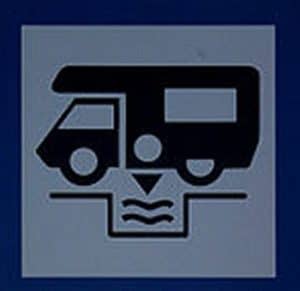Traveling by motorhome in France is significantly enhanced by staying in Aires. I spent many inexpensive and free nights at Aires in France and in Spain on my recent European trip.
What is a French Aire de Camping Car? An Aire is a place to park and stay overnight in a motorhome and is popular and widespread in France. They can be free or have a small cost and facilities vary from Aire to Aire.
France is set up for motorhomes traveling and most towns welcome visitors and provide inexpensive or free spaces to stay, dedicated to motorhome owners.

What is an Aire?
There are several types of Aires de Service and Aire de Campingcar.
Some are at main road and motorways service stations, with the majority close to towns.
Aire’s vary from place to place and no two are the same, which makes the exploration of France more interesting.
Aires at service stations situated at a fuel service station are generally on major roads and motorways. These can be compared to a British motorway service area, but with parking dedicated to motorhomes. These parking areas are often shared with lorries, so can be quite noisy at night as traffic comes and goes, so don’t expect a relaxing time overall.
The Aire de Service area as service stations will usually have some basic facilities for a motorhome and can include a grey wastewater dump, fresh water and some provide toilet cassette emptying. Other than that, these are not places you would usually use as a destination. They are best used for a break on your journey, but not recommended for staying overnight.
Aires de CampingCar locations close to towns are the true motorhome Aires in France and they number into the early thousands.
Aire’s vary wildly from place to place but follow a general pattern. You will find them close to the edge of a town or village right across the country. They are almost all just a few minutes walk to the town centre, although some can be more distant.
In their simplest form, an Aire de CampingCar is a space in a car park set aside for motorhomes only. No other vehicles should use these spots. You should check the car park signage to see if there is a cost, although many are either free or just a few euros. Some are free overnight but start to charge again early in the morning. These car parks spaces usually don’t provide any facilities and even sitting outside in a chair is discouraged.
More typically, an Aire in France will be a purpose-built area purely for motorhomes. Cars, caravans, and tents are not permitted to use motorhome Aires. Here, you can expect to find a range of facilities, from grey wastewater to freshwater and black waste dumps.
Who Runs These Aires?
Many Aires in France are run by enlightened local councils.
They see visitors to their towns as likely to spend in shops, restaurants, and other commercial businesses. By providing an Aire, the council is encouraging people to visit the town.
Aire de Communales are run by local communities, who look to encourage people to visit and are generally the best kept.
Some Aires are also run as commercial businesses on private land and others are close to being formal campsites.
How Does an Aire Work?
Unlike a campsite, you can’t book an Aire. They are strictly first-come, first-served.
You can arrive and leave whenever you wish, although vehicle movements overnight are not expected unless you are close to a seaport.
When you arrive, find a space and park up. Check the display boards to see how much and how to pay. My experience in France was that the majority of pay-for Aires have a ticket machine. Most machines today seem to accept either cash or a card, with many now being card only.
At some Aire’s, you will need a token. The information board will tell you where to buy a token, which could be from a cafe, bar, or a nearby shop.
The boards will show how long you are allowed to stay, with 24 hours being the usual norm. Some Aires do allow a day or so longer, but the nature of Aires is that people move on most days.
Other Aires can be free to stay and you take a ticket to display your arrival time.
Facilities in these Aire’s tend to be similar, but how they work differs. For instance, in a free Aire, you can expect to pay for freshwater and to empty your toilet cassette. These are usually a few euros and you will become used to the special service machines points at Aire’s which dispense water and accept your cassette waste. The cost for water can be either, for instance, two euros, for 50-100 litres of water or for a set length of time. Emptying your greywater over the standard grid is generally free.
Depending on the Aire, you may find some or all spaces have access to electricity.
Some Aires have automated barriers where you pay on arrival to let you in. Others, you pay on the way out to lift the exit barrier, so don’t lose your entry ticket!
Aire’s will rarely have any wardens or staff on-site and are 100% self-service.
What if an Aire is Full When I Arrive?
When an Aire is full, it is full, and you will have to move on.
To some extent, it depends on what time you arrive. The later you arrive, the less likely there will be a space. The best time to arrive is late morning to noon when those who were there last night have or are just about to move on.
I’ve had the experience of arriving at a popular Aire at midday to find it full. By sitting there for a few minutes, someone came across and said they were leaving in 15 minutes. That is not uncommon. In less popular regions and out of season, arriving from mid-afternoon will usually see space available.
When I am planning a destination, I will also have a plan B for another Aire at the next town and have had to use that on occasions when the first choice was full when I arrived.
What Does it Cost to Stay at an Aire?
Some are free. In other places, the cost can be just a couple of euros, up to around 15.
Depending on the Aire, freshwater and leaving your wastewater can be free or can cost extra. There is no real standard, so expect to check on the cost as you arrive.
Payment machines vary as well, with some accepting both cash and cards. Others can be cash-only, or card-only, so be prepared for both. In my time in France, I used my Monzo debit card for most stops.
There was one Aire I came across that refused all three of my British cards and seemed for domestic French cardholders only and didn’t have a cash option. In three months of travel, that was the only failure. But I did have a plan B!
How Can I Find an Aire de Service and Aire de Camping-car in France?
As you drive across France, you will see numerous Aire road signs, generally blue and black or green and white pointing to the local Aire. These show an illustration of a motorhome.
There are several apps that work well. In France, the park4nights app is excellent and often has brief reviews and pictures. Also, Searchforsites can be very useful, although it has fewer listed, there is often more information. Both have websites and apps for download. Discover more useful app for motorhomes here.
There are two printed books published by Vicarious Media, one for the north of France and one for the south. These books list many Aires, showing the number of pitches, cost, and facilities, along with the sat nav locations. Each comes with a map showing the locations of each Aire. Vicarious Media also have similar books one covering Spain and Portugal, and another for Belgium, Luxembourg, and the Netherlands.
The disadvantage of books is that they can be out of date and guide you to an Aire which has closed or is now a building site for a block of flats. Using the book and app combination will generally avoid arriving at somewhere which no longer exists.
In France, I first used the books and their excellent maps to identify a possible Aire and to read the basic information. Then, I would check one or both apps for additional pictures, reviews, and updates. On several occasions, this saved me driving to an Aire which had recently closed.
As an Aire can be full when you arrive, it is wise to have a plan B for another Aire close by.
What is a Motorhome Service Point?
In France, there are many service-only points.
A service point is somewhere to let out your grey water waste, often but not always your toilet cassette and in most cases to pick up fresh water. There is generally a charge in the region of two to three euros.
These can be at the side of the road and many are close to or just outside the formal Aires de CampingCar.
Are There Aire’s Close to the Euro Tunnel or Ports?
Yes, you will find a range of Aire’s close to the tunnel and ferry ports.
These can be quite busy and there is a lot of coming and going with people arriving or departing at all hours. They may not be the quietest of places but are convenient.
It is worth considering being a little further out.
Are French Aires Safe?
Those at motorway service stations may feel less safe due to the comings and goings of people and vehicles. Make sure you secure your vehicle if you leave it for even a few minutes.
In towns and villages, an Aire is no less or safer than an equivalent car park where you live at home.
Take all your normal safety routines with your locks and alarms as you would anywhere. If a place doesn’t ‘feel right’ for you, then simply move on to the next.
RELATED QUESTIONS
Are There Any Aire’s in the UK? Very few match the French model, as local councils are nowhere near as enlightened as their French counterparts. Perhaps the most useful one is at Canterbury, which isn’t too far from the Eurotunnel.
What is France Passion? Unlike Aires, these are privately owned stopovers such as a vineyard. Discover more about France Passion here.
